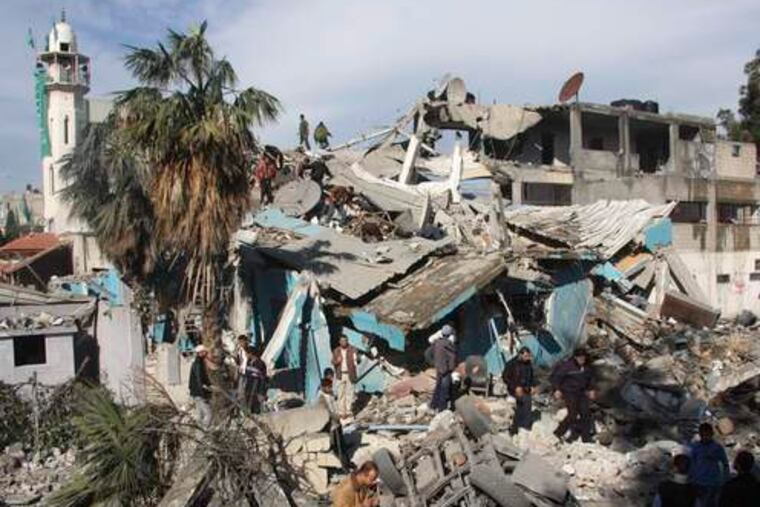Scores die in Israeli attacks
At least 230 were killed in Gaza. U.S. and Israeli officials blamed Hamas rocket fire.

JERUSALEM - The Israeli military unleashed a devastating series of air strikes yesterday on the Hamas-controlled Gaza Strip, targeting security compounds and killing at least 230 people in the deadliest day of the decade for Palestinians.
Palestinian officials said at least 15 civilians were among the dead. At least 400 people were injured in the prolonged attacks, which propelled Israel's confrontation with the militant Islamic group into a new and even more volatile phase.
The White House gave tacit support for the assault by blaming Hamas for provoking the Israeli attack.
"We strongly condemn the repeated rocket and mortar attacks against Israel and hold Hamas responsible for breaking the cease-fire and for the renewal of violence there," Secretary of State Condoleezza Rice said in a statement. "The cease-fire must be restored immediately and fully respected. The United States calls on all concerned to protect innocent lives and to address the urgent humanitarian needs of the people of Gaza."
The Israeli strikes and the Bush administration's response to them could spark a new spiral of violence, undermine stagnant peace talks with moderate Palestinian Authority President Mahmoud Abbas, and make it harder for President-elect Barack Obama to push new diplomatic initiatives in the Middle East when he takes office next month.
Israeli leaders, however, said they could no longer allow Gaza militants to fire rockets into southern Israel. Rocket and mortar attacks have killed at least seven Israelis in the last two years, including one yesterday.
"There is a time for calm and a time for fighting, and now the time has come for fighting," Israeli Defense Minister Ehud Barak said in a televised news conference yesterday evening after the first rounds of air strikes had been launched.
Even during the height of the second Palestinian uprising and Israel's "Operation Defensive Shield" in 2002, no day was as bloody.
"Never, never, never in our history in Gaza have we seen such a scale of killing in one hour," said Eyad Sarraj, the founder of the Gaza Community Mental Health Program, an independent nonprofit in Gaza City. "The scale is horrifying."
The impact of the attacks cascaded across the Middle East, with Israeli soldiers clashing with demonstrators in East Jerusalem, Islamist demonstrators in Amman demanding revenge, the Arab League calling an emergency meeting, and Hamas leaders in Damascus vowing to respond with force.
Throughout the day, Gaza militants fired dozens of homemade rockets into southern Israel, including one that hit a house, killing one person and injuring several others.
Hundreds of Israeli infantry and armored corps troops headed for the Gaza border in preparation for a possible ground invasion, military officials said, speaking on condition of anonymity under army guidelines.
A second wave of attacks on Gaza was directed at squads who fired about 180 rockets and mortars at Israeli border communities. Palestinians said Israeli bombs destroyed a mosque early today. The military called it a "base for terrorist activities."
Another target early today was the Al Aqsa TV station used by Hamas. Its studio building was destroyed, but the station remained on the air with a mobile unit. Palestinians counted about 20 air strikes in the early hours today.
Israeli Foreign Minister Tzipi Livni said Hamas' political leaders could soon be targeted. ""Hamas is a terrorist organization, and nobody is immune," she declared.
In a live, televised address that nearly coincided with an evening air strike in Gaza, Israeli Prime Minister Ehud Olmert told his country to brace for a prolonged and potentially costly military operation. He also issued an appeal to the 1.5 million Palestinians living under Hamas rule in Gaza.
"You, the citizens of Gaza, are not our enemies," Olmert said. "Hamas, [Islamic] Jihad and the other terrorist organizations are your enemies, as they are our enemies. They brought disaster on you, and they tried to bring disaster to the people of Israel."
Palestinian leaders across the political spectrum, however, denounced the Israeli attack as destabilizing and provocative. Hamas spokesman Fawzi Barhoum called the strikes a "massacre" and said the Islamist group would respond in kind.
Although Israel has warned for days that it was preparing to attack, the air strikes appeared to catch Hamas off-guard.
At the time of the first bombing run yesterday morning, Gaza Strip compounds were bustling. Security forces at one Gaza City police compound were seen training in a courtyard before the strike, and gruesome television footage showed dozens of bloody, uniformed Palestinians lying lifeless in the courtyard after the attack, which Hamas said hit a graduation ceremony.
Israeli planes hit virtually every Palestinian security center in the Gaza Strip, including the main police compound in Gaza City, the intelligence headquarters, and the beachside presidential compound that Hamas took over in June 2007 when its militant wing routed forces loyal to Abbas.
Ambulances rushed from one bombing target to another as survivors cried out in anguish and defiance. Palestinians piled the dead into the backs of pickup trucks and hustled the living into private cars that rushed to frenzied hospitals.
Muawiya Hassanein, the head of emergency services for the Hamas-controlled Ministry of Health in Gaza, said that most of the Palestinians killed in the strikes were members of the Gaza Strip police and security services, including Maj. Gen. Tawfiq Jaber, the head of the Gaza Strip police force. The attacks, however, also killed women and children, he said.
Israel staged the strikes after trying unsuccessfully to secure a new cease-fire with Hamas, which agreed to a six-month truce that broke down earlier this month.
The cease-fire brokered by Egypt brought relative calm, but it failed to lay the groundwork for further progress in talks between Israel and Hamas, which seized military control of Gaza in June 2007.